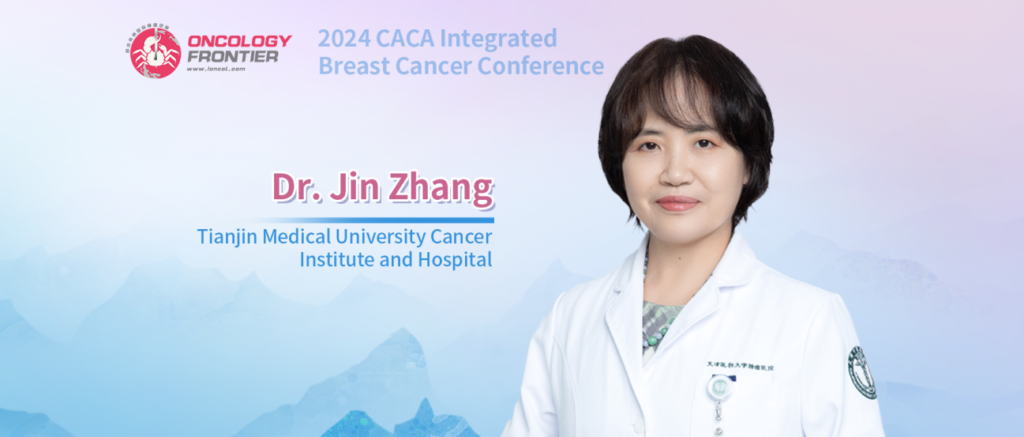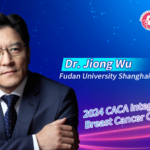
Editor's Note: The "2024 CACA Integrated Breast Cancer Conference," hosted by the Chinese Anti-Cancer Association and the Chinese Anti-Cancer Association's Breast Cancer Committee, was held in Kunming, Yunnan, from July 12-13, 2024. The conference, under the theme "Cancer Prevention and Treatment: Winning Through Integration," focused on new concepts, knowledge, and technologies in breast cancer diagnosis and treatment, discussing strategies for precise and standardized treatment. During the event, the 10th Committee of the Chinese Anti-Cancer Association's Breast Cancer Professional Committee (referred to as the Committee) was elected. Dr. Jin Zhang from Tianjin Medical University Cancer Institute and Hospital was elected as the Chair of the 10th Committee. In an interview, Professor Zhang shared her vision for the future work of the Committee and her insights on integrating breast cancer prevention and treatment efforts.01
Oncology Frontier: Could you share your thoughts on being elected and your plans for the future work of the Committee?
Dr. Jin Zhang: The CACA Breast Cancer Professional Committee, one of the key branches established at the inception of the CACA, has now entered its 10th term. I would first like to express my deepest gratitude for the trust and responsibility bestowed upon me by the CACA and the Committee. The CACA Breast Cancer Committee carries a significant historical mission and has become one of the largest committees within the CACA in terms of membership and activities.
Building on the achievements of the previous nine committees, we recognize that our responsibilities and missions are even greater. The efforts and accomplishments of past members have significantly advanced breast cancer prevention and treatment in China, serving as our guiding light. Facing the demands of high-quality development and new challenges in our country, the 10th Committee feels both pressure and confidence. We understand that standing tall allows us to see further.
Therefore, we will continue to uphold our original mission, working hand-in-hand with members across the nation, weathering challenges together, and unwaveringly advancing along the path of the “Healthy China” strategy. We will focus on the comprehensive development of breast cancer prevention, screening, diagnosis, treatment, and rehabilitation, promoting the spread of new technologies and ideas to every corner of the country, from provinces to counties and townships, ensuring the effective implementation of breast cancer prevention and treatment tasks.
Moreover, we are committed to enhancing China’s international influence in breast cancer research. As breast cancer poses the number one threat to women’s health, its global research frontiers lead the latest directions in oncology research. We are confident and capable of seeking mutual benefits through strengthened international cooperation and exchange, not only with Western countries but also by promoting our prevention and treatment experience and technology to countries along the “Belt and Road.” China’s vast team of breast cancer experts, rich case resources, and leading medical resources provide us with unique development conditions. We should not be content with the status quo but should take on the responsibility and compete actively, striving to export our successful experiences and advanced technologies, and contribute China’s wisdom and voice to the global fight against breast cancer.
Lastly, I want to thank everyone for their continued attention and support for the CACA Breast Cancer Professional Committee. In the future, we look forward to deepening our cooperation with all parties, jointly shouldering the important mission of advancing breast cancer prevention and treatment, and working together to create a bright future. Thank you for your hard work and relentless efforts!
02
Oncology Frontier: As an expert who has been deeply involved in breast cancer prevention and treatment for many years, what are your views on the current state of breast cancer diagnosis and treatment in China? What unmet clinical needs remain?
Dr. Jin Zhang: This question is highly forward-looking and accurately touches on the key pain points, bottlenecks, and unmet clinical needs in our field. These issues represent the profound challenges embedded in those breast cancer cases that have not been completely cured. As healthcare professionals involved in the entire chain of breast cancer prevention, screening, diagnosis, treatment, and rehabilitation, we bear significant responsibilities.
There remain significant unmet clinical needs among breast cancer patients in China. With advancements in medical technology, the survival rate of breast cancer patients is gradually improving, laying a foundation for achieving the “Healthy China 2030 Plan” target of increasing the overall five-year cancer survival rate to 46.6%. However, despite these achievements, we must remain clear-headed about the persistent unmet clinical needs. Breast cancer, as a “benchmark” and “testing ground” for solid tumor research, has always been at the forefront of molecular mechanism research and precision medicine advancements. For instance, the first ADC drug targeting solid tumors was born in the field of breast cancer, and the concepts and techniques of precision medicine have been widely applied here. Nonetheless, a small portion of breast cancer patients still face the risk of recurrence and metastasis at different stages, requiring us to continually deepen our understanding of the disease and expand the boundaries of treatment to benefit more patients.
This situation presents new challenges to us as clinicians, basic researchers, and professionals in the diagnostic field. We need to constantly enhance our professional knowledge, deepen our understanding of the molecular nature of the disease, and stay at the forefront of the discipline’s development, approaching these challenges with a higher perspective and deeper insight. Simultaneously, we eagerly anticipate that the most cutting-edge and advanced technologies can be quickly applied to breast cancer treatment. The implementation of these new technologies and research not only requires the relentless efforts of researchers but also the active practice of clinicians to translate them into patient survival benefits. Faced with these new challenges and opportunities, each of us has the responsibility to rise to the occasion and contribute our strength.
03
Oncology Frontier: The theme of this conference is “Cancer Prevention and Treatment: Winning Through Integration.” What do you think is the importance of this concept for breast cancer prevention and treatment, and how should clinicians promote integrated breast cancer prevention and treatment?
Dr. Jin Zhang: “Cancer Prevention and Treatment: Winning Through Integration” is especially evident in breast cancer prevention and treatment. Integration refers to integrating different treatment plans and methods, and even more so, from molecular mechanisms to clinical frontiers, achieving comprehensive integration “from bench to bedside.” This is an all-encompassing integration that requires us to adopt this concept throughout the entire process of cancer prevention, screening, diagnosis, treatment, and rehabilitation.
Similarly, we need to embrace new diagnostic and treatment technologies with full enthusiasm, incorporating the cutting-edge results of these technologies into our practice. Elevating breast cancer management to full lifecycle management under the integrated medicine concept is key to ensuring patients achieve longer survival periods and even lifelong health. Implementing the concept of “integrated medicine” is not simply a matter of words or holding an MDT (multidisciplinary team) meeting. It requires us to delve deep into disease areas, refine our techniques, optimize medical process management, and put significant effort into all aspects of our discipline. Only in this way can we truly achieve integration and transform the results of this integration into the hope of life for countless breast cancer patients.
In the context of “integrated medicine,” building our department team’s capabilities is also crucial. Each department, or even each major department, can be subdivided into different teams, and each team and individual needs to clearly understand their role and responsibility in integration. You need to fully grasp which part of the integration you are responsible for and what standards you need to meet to be considered qualified. Based on the current status of China’s tiered diagnosis and treatment, I believe that to implement the concept of “integrated medicine,” it is first necessary for every member of the team to establish an “integration” concept and clarify their direction. At the same time, we also need to make tremendous efforts to promote the development of new productive forces in a precise and high-quality manner. This requires everyone working in the entire process of “prevention, screening, diagnosis, treatment, and rehabilitation” to contribute diligently, including inheriting the humanistic spirit and providing practical technical guidance.
Dr. Jin Zhang
- Professor, Chief Physician, Doctoral Supervisor
- Assistant Director of Tianjin Medical University Cancer Institute and Hospital
- Executive Deputy Director of the Tianjin Breast Cancer Prevention and Research Center
- Director of the Third Breast Cancer Department, Tianjin Medical University Cancer Institute and Hospital
- Expert with Special Government Allowance from the State Council
- Recipient of the Fourth “National Famous Doctor” Honor
- Member of the ESMO Breast Cancer Expert Committee
- Chair of the 10th Breast Cancer Professional Committee, Chinese Anti-Cancer Association
- Vice Chair of the Multidisciplinary Cancer Diagnosis and Treatment (MDT) Professional Committee, Chinese Anti-Cancer Association
- Member of the Oncology Branch of the Chinese Medical Association
- Deputy Leader of the Early Diagnosis and Treatment Group for Malignant Tumors, Oncology Branch, Chinese Medical Association
- Member of the Breast Cancer Group, Surgery Branch, Chinese Medical Association
- Deputy Leader of the Breast Surgery Expert Working Group, Surgery Branch, Chinese Medical Association
- Standing Member of the MDT Expert Committee, Chinese Medical Association
- Chair of the Oncology Branch, Tianjin Medical Association
- Executive Director of Tianjin Anti-Cancer Association
- Chair of the Breast Cancer Quality Control Expert Committee, Tianjin


